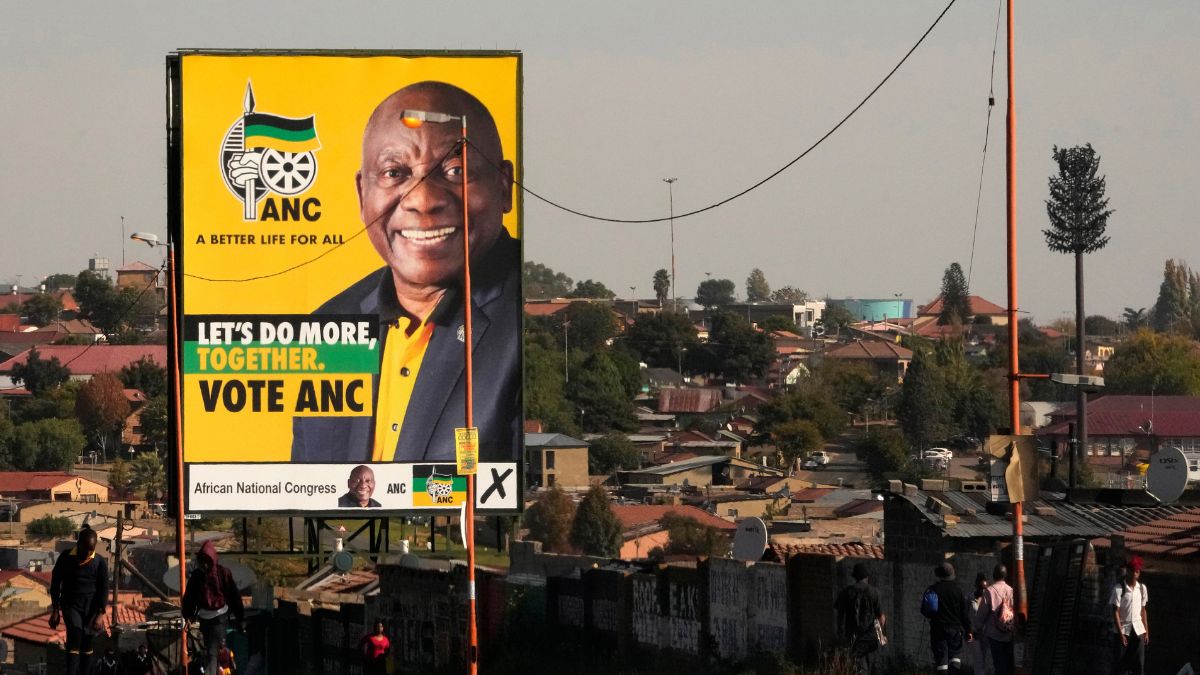Is the African National Congress’ time at the helm in South Africa over?
Founded on 8 January 1912 in Bloemfontein, the ANC reached lofty heights under Nelson Mandela after the end of apartheid.
But the once mighty party, which has ruled South Africa for 30 years, has been buffetted by unemployment, corruption and poverty.
Now, most opinion polls predict that the ANC will, for the first time, lose its parliamentary majority in the upcoming 29 May polls.
But what happens next? Can the ANC work in a coalition government?
Let’s take a look at the main players in the upcoming polls.
Cyril Ramaphosa
President Cyril Ramaphosa was once thought of as a Mandela protege.
Though he rose up in the ANC in the early 1990s, he left the party to become a successful businessman.
Politics eventually lured him back in 2014 when he returned as South Africa’s deputy president.
Ramaphosa rose to become the country’s president in 2018 after Jacob Zuma resigned after a raft of corruption allegations.
To be fair, Ramaphosa has tried to rebuild the reputation of the ANC.
Impact Shorts
More ShortsHe has cracked down on government graft
But South Africa, which has an unemployment rate of 32 per cent — the highest in the world — is in a full-blown crisis.
Poverty is also rife, while an electricity crisis has left much of the nation of 62 million in the dark.
These events have dented the economy as well as hit Ramaphosa’s reputation as a problem solver.
Though the ANC is still predicted to win the largest vote share, it will likely need partners to help it remain in power with Ramaphosa as the head.
John Steenhuisen
Steenhuisen is the head of the Democratic Alliance, the main South African Opposition.
The party, which has vowed to save South Africa from what it claims is the ANC’s corruption and mismanagement, has an uphill battle.
Never has the DA even come close to winning a national election.
The party took just 22 per cent of votes in the previous 2019 general election compared to the ANC’s 62 per cent.
The DA entered a pre-poll alliance with smaller Opposition parties.
They hope to combine their votes and win a majority.
However, this looks extremely unlikely as all of them would have to massively increase their vote share.
Interestingly, Steenhuisen is the sole white face in mainstream politics in South Africa.
In a country where race is still at the forefront of the national consciousness, that has led to charges that the DA represents the interests of the white minority more than the 80 per cent of South Africans who are Black.
The dark horse
The Economic Freedom Fighters has become the country’s third largest party in little over a decade.
The party was founded in 2013 by ex-ANC leader Julius Malema.
Malema, 43, who was thrown out of the ANC, is South Africa’s most controversial politician thanks to his fiery, far-left rhetoric.
Malema’s claims that the ANC has failed poor, Black South Africans is becoming increasingly popular with the unemployed and disillusioned youth.
The EFF has called for mines to be nationalised.
They also want poor Blacks to receive land.
The party, which follows a Marxist ideology, says an economic inequality based on race persists decades after apartheid, with whites generally rich and Blacks still poor.
Malema and other EFF lawmakers have regularly interrupted speeches by opponents in Parliament and been involved in scuffles with security guards in the chamber, bringing a militant brand of politics to the heart of South Africa’s democracy. The EFF is a possible coalition partner for the ANC, although neither party has said if there is any agreement.
The former president
Zuma in December threw many for a loop.
The former president, ousted ignominiously in 2018, announced that he was back – with a new party.
While Zuma’s MK Party is not in the running, it will likely eat into the ANC support.
The 81-year-old Zuma still has many followers, especially in his home KwaZulu-Natal province.
His reemergence also raised security concerns for the election after his conviction for contempt of court and prison sentence in 2021 sparked a week of rioting and looting that led to the deaths of more than 350 people in the worst violence in South Africa since the troublesome last days of apartheid.
Zuma is involved in a court battle over whether his criminal conviction prevents him from standing as a candidate for Parliament. There are concerns over unrest if he is disqualified.
Even if he isn’t, his new reputation as an agitator is likely to increase tensions around a pivotal election.
With inputs from agencies


)

)
)
)
)
)
)
)
)



